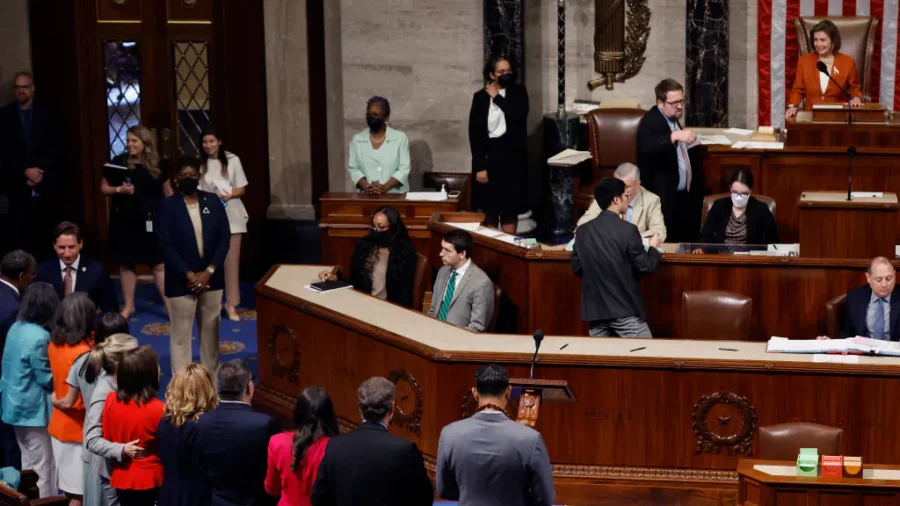Attorneys general representing half of the country on May 1 sued President Joe Biden’s administration over a new rule requiring criminal background checks for all gun sales, including private sales.
Lawsuits in Florida, Texas, and Arkansas are asking the courts to block a rule from the Bureau of Alcohol, Tobacco, Firearms and Explosives (ATF) that redefines “engaged in the business” of dealing in firearms.
Under the new rule, almost every transfer of firearm ownership would require at least one party to have a Federal Firearms License and perform a criminal background check, including private sales.
U.S. Attorney General Merrick Garland signed the new rule on April 10, and it goes into effect on May 10.
According to the 466-page rule, the only requirement for determining whether a person is engaged in the business of selling guns is whether the person is trading to “predominately earn a profit.” Previously, the defining characteristic was whether the dealer worked to earn a “livelihood.”
The new definition is in the Bipartisan Safer Communities Act (BSCA), signed into law on June 25, 2022.
In the Florida case, Florida Attorney General Ashley Moody filed suit in the U.S. District Court for the Middle District of Florida.
According to the lawsuit Ms. Moody filed on May 1, the act was passed to balance gun owners’ rights against public safety concerns.
In the filing, Ms. Moody wrote that the BSCA’s sponsors assured voters that the law clarified that dealers were only those who earned their livelihood from selling guns. Ms. Moody claims that President Biden is stretching the language of the act to fit his political agenda.
“Sensing an opportunity, the Biden Administration now seeks to exploit the minor changes to federal law enacted in the BSCA to implement President Biden’s preferred policies by executive fiat,” Ms. Moody wrote.
The other two lawsuits—filed in the Northern District of Texas and Eastern District of Arkansas—also decry the change as an unconstitutional infringement on Americans’ Second Amendment rights and an illegal attempt to circumvent the U.S. Congress and enact “universal background checks.”
President Biden has called for expanding the criminal background check requirement since his election in 2020.
Each suit asks its respective court to block the rule’s enforcement and find that it violates the U.S. Constitution and the Administrative Procedures Act.
ATF spokesperson Kristina Mastropasqua said the agency had no comment on the lawsuits.
The White House did not respond to requests from The Epoch Times for comment on this story.

The attorneys general say they are defending their constituents’ rights.
“This lawsuit is just the latest instance of me and my colleagues in other states having to remind the President that he must follow the law,” Arkansas Attorney General Tim Griffin wrote in a press release on May 1.
Mr. Griffin joined Kansas Attorney General Kris Kobach in the largest suit, representing 21 states. They say the new rule completely reverses decades of legal precedence that protected the right of private parties to buy, sell, or trade firearms without government intrusion.
“Defendants’ claim of authority to implement this scheme dramatically upends both our constitutional traditions and the federal firearms licensing regime Congress designed,” the lawsuit states.
In addition to Kansas and Arkansas, the plaintiffs in the Arkansas lawsuit include Iowa, Montana, Alabama, Alaska, Georgia, Indiana, Idaho, Kentucky, Missouri, Nebraska, New Hampshire, North Dakota, Oklahoma, South Carolina, South Dakota, Tennessee, Virginia, West Virginia, and Wyoming.
Private citizens Phillip Journey, Allen Black, Donald Maxey, and the Chisholm Trail Antique Gun Association joined the lawsuit as plaintiffs.
They are suing Mr. Garland, ATF Director Steven Dettelbach, the U.S. Department of Justice, and the ATF.

“This rule is blatantly unconstitutional. We are suing to defend the Second Amendment rights of all Americans,” Mr. Kobach wrote in a press release on his state website.
In Texas, four states, four Second Amendment Advocacy groups, and one individual are challenging the rule in the U.S. District Court for the Northern District of Texas in Amarillo.
That lawsuit was filed on May 1 by the states of Texas, Mississippi, Louisiana, and Utah, along with Gun Owners of America Inc., the Gun Owners’ Foundation, the Tennessee Firearms Association, the Virginia Citizens Defense League, and Jefferey W. Tormey.
Texas Attorney General Ken Paxton issued a press release calling the new rule an affront to the Constitution.
“Yet again, Joe Biden is weaponizing the federal bureaucracy to rip up the Constitution and destroy our citizens’ Second Amendment rights,” Mr. Paxton’s statement reads.
Gun Owners of America Eric Pratt said allowing the rule to stand would send a dangerous message to other government agencies. In the press release, Mr. Pratt wrote that the rule must be struck down entirely.
“Anything less would further encourage this tyrannical administration to continue weaponizing vague statutes into policies that are meant to further harass and intimidate gun owners and dealers at every turn.”
From The Epoch Times


